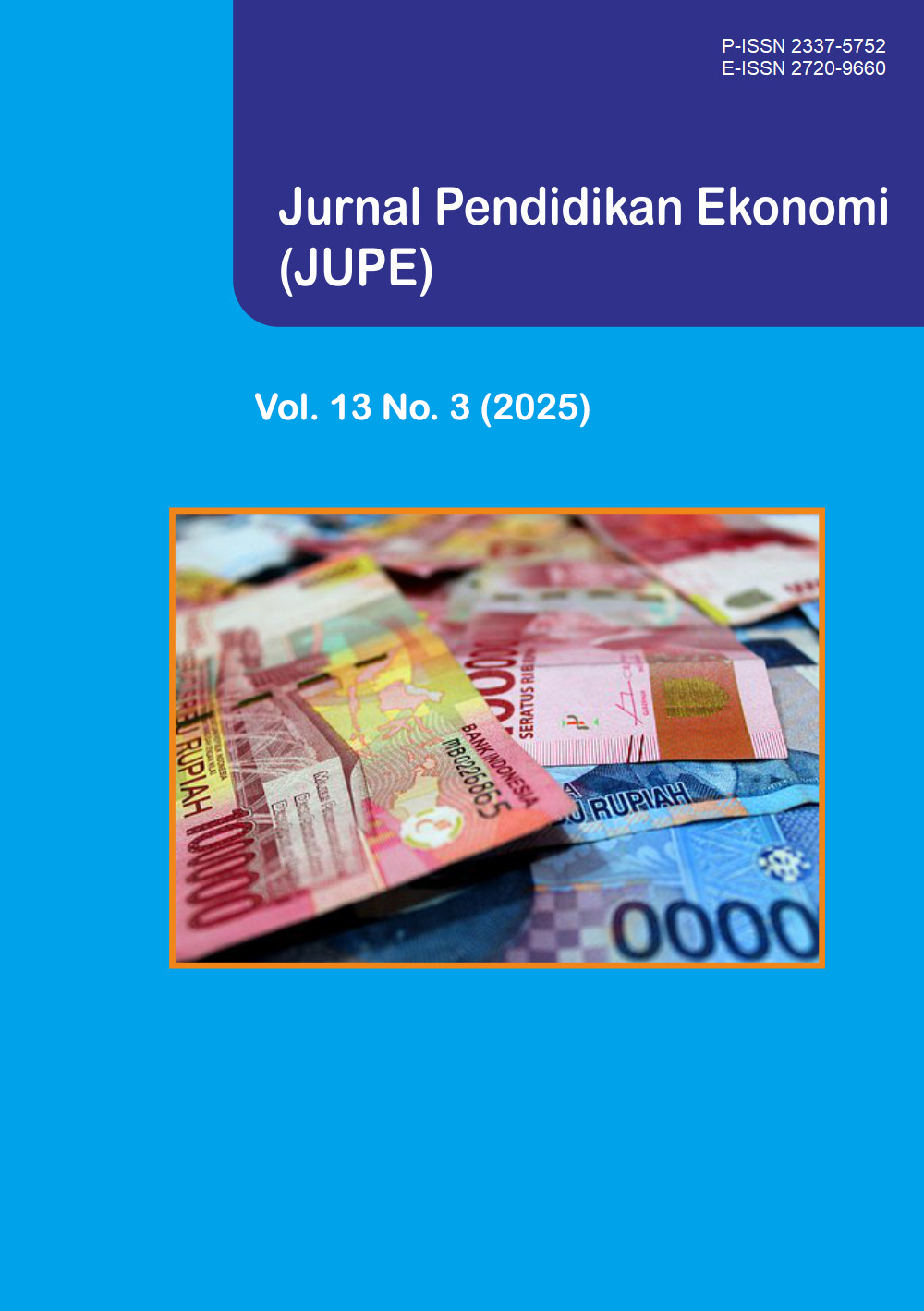Pengaruh norma subjektif dan need for achievement terhadap intensi berwirausaha mahasiswa
DOI:
https://doi.org/10.26740/jupe.v13n3.p325-334Keywords:
Subjective Norm, Need For Achievement, Entrepreneurial IntentionAbstract
The low interest in entrepreneurship among students contributes to the high rate of educated unemployment in Indonesia. The high rate of educated unemployment in Indonesia necessitatesan increase in entrepreneurial intention among students. This study aims to analyze the influence of subjective norms and need for achievement on students entrepreneurial intention The method used is descriptive associative, and data were obtained thru the distribution of questionnaires to 308 randomly selected students. The results of this study indicate that subjective norms and the need for archievement significantly influence entrepreneurial intention. This finding confirms that social support from the surrounding environment and the drive to achieve are important factors in shaping students intention to start a business.
Downloads
References
Adi, F, U Sumarwan, I Fahmi, Fajar Adi, Ujang Sumarwan, and Idqan Fahmi. 2017. “Literasi Keuangan Syariah Dan Konvensional Terhadap Minat Berwirausaha Pada Mahasiswa The Influence of Attitude , Subjective Norm , Demography , Sosioeconomic and Shariah and Conventional Financial Literacy Toward Entrepreneurship Intention Among College .” 5(1):1–20.
Ahmad, S., Naseer, S., & Humayoun, A. A. (2022). Subjective norms and entrepreneurial intentions among university students: The mediating role of entrepreneurial attitude. Journal of Entrepreneurship in Emerging Economies, 14(3), 428-447. https://doi.org/10.1108/JEEE-03-2021-0098
Ajzen, Icek, Fishbein, and Martin. 2005. “Personality and Behaviour, Second Edition.” Open University Press.
Ajzen, I., & Kruglanski, A. W. (2020). Reasoned action in the service of goal pursuit. Psychological Review, 127(3), 538–560. https://doi.org/10.1037/rev0000178
Al-Jubari, I., Hassan, A., & Liñán, F. (2022). Entrepreneurial intention among university students: An integrated model of TPB and entrepreneurial event model. International Entrepreneurship and Management Journal, 18(4), 1381-1404. https://doi.org/10.1007/s11365-021-00755-2
Amofah, Kwaku, and Ramon Saladrigues. 2022. “Impact of Attitude towards Entrepreneurship Education and Role Models on Entrepreneurial Intention.” Journal of Innovation and Entrepreneurship 11(1). doi: 10.1186/s13731-022-00197-5.
Anggraini, Rona Desi Sanchez, and Patricia. 2018. “BEHAVIORAL CONTROL , DAN SUBJECTIVE NORM TERHADAP ENTREPRENEURIAL INTENTION.” Ekonomi Dan Bisnis 5(2):96–105. doi: 10.35590/jeb.v5i2.745.
Auna, Moh Sarifudin S. 2020. “Locus of Control and Self-Efficacy on Entrepreneurial Intentions in the Digital Age.” 395(Acpch 2019):289–92.
Block, Joern H., Christian O. Fisch, and Mirjam van Praag. 2017. “The Schumpeterian Entrepreneur: A Review of the Empirical Evidence on the Antecedents, Behaviour and Consequences of Innovative Entrepreneurship.” Industry and Innovation 24(1):61–95. doi: 10.1080/13662716.2016.1216397.
Buli, B. M., & Yesuf, W. M. (2020). Determinants of entrepreneurial intention: Evidence from graduating students of Jimma University. Cogent Business & Management, 7(1), 1776621. https://doi.org/10.1080/23311975.2020.1776621
Chen, L., & Liu, W. (2020). The impact of entrepreneurship education on entrepreneurial intention: A meta-analysis. Educational Research Review, 31, 100348. https://doi.org/10.1016/j.edurev.2020.100348
Effendi, M. I., Ghozali, I., & Hidayat, S. E. (2023). The influence of subjective norm and self-efficacy on entrepreneurial intention among youth. Journal of Entrepreneurship Education, 26(1), 1–11.
Farrukh, M., Khan, A. A., Khan, M. S., Ramzani, S. R., & Soladoye, B. S. (2020). Entrepreneurial intentions: The role of family factors, personality traits and self-efficacy. World Journal of Entrepreneurship, Management and Sustainable Development, 16(4), 243-259. https://doi.org/10.1108/WJEMSD-03-2019-0019
Dedy Takdir, Mahmudin, Sudirman Zaid. 2016. “Kewirausahaan.” Kewirausahaan 1–150.
Ferrante, Francesco, Daniela Federici, and Valentino Parisi. 2019. “The Entrepreneurial Engagement of Italian University Students: Some Insights from a Population-Based Survey.” Studies in Higher Education 44(11):1813–36. doi: 10.1080/03075079.2018.1458223.
Firmansyah, M. Ananng, and Anita Rosmawarni. 2019. “Kewirausahaan (Dasar Dan Konsep.” Buku (September):15.
Hossain, M. I., Saleh, M. A., & Drennan, J. (2021). Factors influencing university students’ entrepreneurial intention: Evidence from a developing nation. Education + Training, 63(9), 1310–1332. https://doi.org/10.1108/ET-06-2020-0172
Hueso, J. A., Jaén, I., & Liñán, F. (2021). From personal values to entrepreneurial intention: A systematic literature review. International Journal of Entrepreneurial Behavior & Research, 27(1), 205-230. https://doi.org/10.1108/IJEBR-06-2020-0383
Li, C., Ahmed, N., Qalati, S. A., Khan, A., & Naz, S. (2020). Role of business incubators as a tool for entrepreneurship development: The mediating and moderating role of business start-up and government regulations. Sustainability, 12(5), 1822. https://doi.org/10.3390/su12051822
Mahfud, T., Triyono, M. B., Sudira, P., & Mulyani, Y. (2020). The influence of social norms and self-efficacy on entrepreneurial intention through entrepreneurial attitude. Journal of Entrepreneurship Education, 23(3), 1–9. https://doi.org/10.13140/RG.2.2.29241.52322
Martinez, D., O'Sullivan, P., Smith, M., & Esposito, M. (2020). Psychological antecedents of entrepreneurial intention among university students: The role of need for achievement and risk tolerance. International Journal of Management Education, 18(3), 100425. https://doi.org/10.1016/j.ijme.2020.100425
Nabi, G., Walmsley, A., Liñán, F., Akhtar, I., & Neame, C. (2023). Does entrepreneurship education in the first year of higher education develop entrepreneurial intentions? The role of learning and inspiration. Studies in Higher Education, 48(2), 271-285. https://doi.org/10.1080/03075079.2022.2133961
Nguyen, C. (2021). Entrepreneurial intention of international business students in Vietnam: A survey of the Theory of Planned Behavior. Journal of Asian Finance, Economics and Business, 8(3), 1001–1010.
Izek Ajzen. 1991. “Attitudes, Personality, And Behavior.” Medical Teacher 13(4):273–79.
Netemeyer, Richard, and Michelle Van Ryn. 1991. “The Theory of Planned Behavior.”
Nizma, Cut, and Dina Arfianti Siregar. 2018. “Analisis Pengaruh Locus of Control, Need for Achievement Dan Risk Taking Terhadap Intensi Berwirausaha Alumni Mahasiswa Jurusan Akuntansi Politeknik Negeri Medan.” 19(1):30–37.
Omardi, Okem Boy, Abu Talkah, and Ahsin Daroini. 2020. “Pengaruh Pendidikan Kewirausahaan , Lingkungan Keluarga Dan Efikasi Diri Terhadap Intensi Berwirausaha Mahasiswa Di STKIP PGRI Tulungagung (Studi Pada Mahasiswa Pendidikan Ekonomi Tahun 2019-2020).” Otonomi 20(1):1–9.
Pranata, Nadin Kalista, and Margunai. 2019. “Pengaruh Sikap Berwirausaha, Norma Subjektif Dan Pendidikan Kewirausahaan Intensi Berwirausaha.” Economic Education Analysis Journal (EEAJ) 8(2):533–50. doi: 10.15294/eeaj.v8i2.31489.
Primandaru, Noormalita. 2017. “Analisis Faktor-Faktor Yang Berpengaruh Pada Minat Berwirausaha Mahasiswa.” Jurnal Economia 13.
Rahman, A., & Wibowo, A. (2020). Need for achievement and entrepreneurial intention among Indonesian students. International Journal of Entrepreneurship, 24(Special Issue), 1–9.
Rodriguez, A., Santos, F. J., & Liñán, F. (2021). University environment and entrepreneurial intentions: The mediating role of entrepreneurial orientation. Journal of Small Business Management, 59(4), 667-695. https://doi.org/10.1080/00472778.2020.1818387
Rouf, F. 2021. “Tawaran Program Kewirausahaan Mahasiswa Indonesia 2021. Direkturi Jenderal Pendidikan Tinggi Kementerian Pendidikan, Kebudayaan, Riset Dan Teknologi.”
Simatupang, Taruli Serefina. 2020. INTENSI BERWIRAUSAHA Sebuah Konsep Dan Studi Kasus Di Era Revolusi Industri 4.0.
Sudrajad. 2011. Kiat Mengentaskan Pengangguran Dan Kemiskinan Melalui Wirausaha.
Suryana. 2013. Kewirausahaan Kiat Dan Proses Menuju Sukses.
Soomro, B. A., Ghumro, I. A., & Shah, N. (2020). Green entrepreneurship inclination among the younger generation: An avenue towards a green economy. Sustainable Development, 28(4), 585-594. https://doi.org/10.1002/sd.2010
Thompson, K. S., Jeffries, F. L., & Topping, S. (2022). Entrepreneurship education and need for achievement: Understanding the relationship in university students. Education + Training, 64(2), 234-248. https://doi.org/10.1108/ET-05-2021-0175
Turker, D., & Selcuk, S. S. (2009). Which factors affect entrepreneurial intention of university students? Journal of European Industrial Training, 33(2), 142-159.
Wang, D., Wang, L., & Chen, L. (2021). Unlocking the influence of family support on entrepreneurial intention: Testing the chain mediation model of self-efficacy and entrepreneurial attitude. Frontiers in Psychology, 12, 618669. https://doi.org/10.3389/fpsyg.2021.618669
Wijaya, D. A., & Astuti, E. S. (2022). The role of personal attitude and subjective norms in forming entrepreneurial intention. Jurnal Manajemen dan Kewirausahaan, 24(1), 10–20. https://doi.org/10.9744/jmk.24.1.10-20
Wood, R., & Bandura, A. (1989). Social cognitive theory of organizational management. Academy of Management Review, 14(3), 361-384.
Wardana, Dewita Windiartya, and Muhammad Abdul Ghofur. 2024. “Pengaruh Locus Of Control, Need For Achievement, Dan Proactive Personality Terhadap Intensi Berwirausaha Siswa SMA Kabupaten Gresik.” JURNAL PROMOSI Jurnal Pendidikan Ekonomi UM Metro 12(1):232–46.
Yurtkoru, E. S., Acar, P., & Teraman, B. S. (2024). Willingness to take risk, entrepreneurial intention and entrepreneurial behavior: A configurational approach. International Journal of Entrepreneurial Behavior & Research, 30(2), 435-457. https://doi.org/10.1108/IJEBR-08-2022-0734
Zhao, H., Seibert, S. E., & Hills, G. E. (2005). The mediating role of self-efficacy in the development of entrepreneurial intentions. Journal of Applied Psychology, 90(6), 1265-1272.
Zhang, Pingying, Dongyuan D. Wang, and Crystal L. Owen. 2015. “A Study of Entrepreneurial Intention of University Students.” Entrepreneurship Research Journal 5(1):61–82. doi: 10.1515/erj-2014-0004.
Zulkarnain, Wildan, Djum Djum, and Noor Benty. 2017. “Need Analysis Mapping of Entrepreneurship Training of University Student.” 128(Icet):23–28.
Downloads
Published
How to Cite
Issue
Section
License
Copyright (c) 2025 Yulistiani Telaumbanua, Sri Arita (Author)

This work is licensed under a Creative Commons Attribution-NonCommercial 4.0 International License.
Copyright
- Authors retain copyright and grant the journal right of first publication with the work simultaneously licensed under a Creative Commons Attribution License that allows others to share the work with an acknowledgment of the work's authorship and initial publication in this journal.
 Abstract views: 123
,
Abstract views: 123
, PDF Downloads: 120
PDF Downloads: 120











